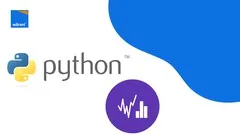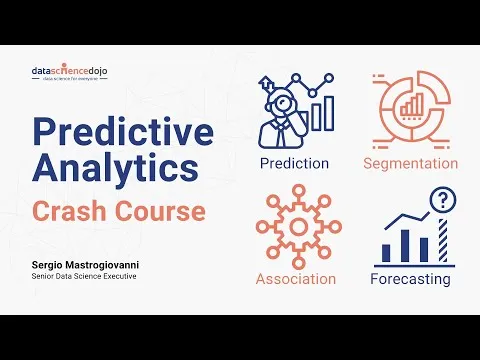
SAS Predictive Modeling - Predictive Analytics and Modeling 
Learn the art of predictive modeling with the SAS Predictive Modeling course. Discover how to create, test, and validate models using statistical concepts to predict outcomes. This course covers a range of methods including machine learning and artificial intelligence. Gain the skills to analyze complex data patterns and make intuitive decisions. With hands-on coding experience using Minitab, SAS, and SPSS, you'll be industry-ready for real-life use cases. Don't miss out on the biggest job opportunities of the 21st century - enroll in this course today and unlock your potential in predictive analytics and modeling. ▼
ADVERTISEMENT
Course Feature
![]() Cost:
Cost:
Paid
![]() Provider:
Provider:
Udemy
![]() Certificate:
Certificate:
Paid Certification
![]() Language:
Language:
English
![]() Start Date:
Start Date:
2022-06-07
Course Overview
❗The content presented here is sourced directly from Udemy platform. For comprehensive course details, including enrollment information, simply click on the 'Go to class' link on our website.
Updated in [September 15th, 2023]
What does this course tell?
(Please note that the following overview content is from the original platform)
Predictive modeling can be understood as the process of creation test and validation of a model It uses concepts from statistics in predicting the outcomes Predictive modeling contains a different set of methods like machine learning statistics artificial intelligence and so on These models are made up of several predictors also called attributes that are likely to impact future results Predictive modeling is currently the most widely used in computer science information technology and information services domainThis predictive modeling course targets to provide predictive modeling skills as mentioned above to business sectors&domains Quantitative methods and predictive modeling concepts from this predictive modeling course could be extensively used in many fields to understand the current customer behavior customer satisfaction financial market trends studying effects of medicine in pharma sectors after drugs are developed and administeredMinitab or SAS and SPSS are among the leading developers in the world towards building statistical analysis software Across the world these software's are used by thousands of companies These are also used by over 10000 universities and colleges for research and teaching Some major clients of Minitab for example consist of Pfizer Royal Bank of Scotland Nestle Boeing Toshiba and DuPontMany independent studies conducted by companies like Mckinsey Gartner and others have predicted that data science machine learning and predictive modeling is going to be the biggest jobs of the 21st century and these professionals are going to be rewarded the best for itThis course covers many tangible skills that students can count on for jobs and career switch These skills are explained here to help students understand the value of this predictive modeling courseSkill to analyze data and see a complex pattern: data understanding and pattern extraction is a key skill for predictive modeling and a successful person in this domain should be able to make sense of data in no time In this course you will learn how to do that You will be taught various types of data distribution data patterns and data understanding techniques These skills will help you lifelong in making better and more intuitive decisions in all fields of workHands-on coding skill: : The predictive modeling course teaches three tools- Minitab SAS and SPSS For that this predictive modeling course is quite good For predictive modeling and machine learning course one needs to be comfortable with coding and hence having a sharp understanding of practical implementation is very important This course teaches all these skills so that the student is industry ready and can comfortably work in real-life use casesStrong understanding of concepts: : Machine learning concepts such as regression classification support vector machines neural network ROC curve and many more concepts are taught which are frequently asked in interviews and which judges a candidate's understanding of predictive modeling
We consider the value of this course from multiple aspects, and finally summarize it for you from three aspects: personal skills, career development, and further study:
(Kindly be aware that our content is optimized by AI tools while also undergoing moderation carefully from our editorial staff.)
What skills and knowledge will you acquire during this course?
During this course, the student will acquire skills and knowledge in predictive modeling and predictive analytics. They will learn how to create, test, and validate models using concepts from statistics. The course covers a range of methods including machine learning, statistics, and artificial intelligence. The student will also learn about the different attributes that make up a predictive model and how they can impact future results.
The course emphasizes the practical application of predictive modeling skills in various business sectors and domains. The student will gain quantitative methods and predictive modeling concepts that can be applied in fields such as understanding customer behavior, analyzing customer satisfaction, studying financial market trends, and evaluating the effects of medicine in the pharmaceutical sector.
The course focuses on using statistical analysis software such as Minitab, SAS, and SPSS. These tools are widely used by companies, universities, and colleges for research and teaching purposes. The student will gain hands-on coding skills in these tools, which are essential for working in the field of predictive modeling and machine learning.
One of the key skills that the student will acquire is the ability to analyze data and identify complex patterns. They will learn various techniques for data understanding and pattern extraction, which will enable them to make better decisions in their work. The course also emphasizes the importance of having a strong understanding of concepts in machine learning, such as regression, classification, support vector machines, neural networks, and ROC curves. These concepts are frequently asked in interviews and demonstrate a candidate's understanding of predictive modeling.
Overall, this course provides the student with tangible skills that are highly valued in the job market. The demand for professionals in data science, machine learning, and predictive modeling is expected to grow in the 21st century, and this course prepares students for rewarding career opportunities in these fields.
How does this course contribute to professional growth?
This course on SAS Predictive Modeling - Predictive Analytics and Modeling contributes significantly to professional growth. By acquiring predictive modeling skills, professionals can enhance their abilities to analyze data and make informed decisions. The course covers various quantitative methods and predictive modeling concepts that can be applied in different fields, such as understanding customer behavior, studying financial market trends, and evaluating the effects of medicine in the pharmaceutical sector.
Moreover, the course focuses on teaching the use of statistical analysis software like Minitab, SAS, and SPSS, which are widely used by companies and academic institutions worldwide. Gaining proficiency in these tools is valuable for professionals seeking job opportunities or considering a career switch. The course also emphasizes the development of hands-on coding skills, which are essential for implementing predictive modeling and machine learning techniques effectively.
Furthermore, the course ensures a strong understanding of key concepts in predictive modeling, including regression, classification, support vector machines, neural networks, and ROC curves. These concepts are frequently asked in interviews and serve as indicators of a candidate's expertise in predictive modeling.
Considering the increasing demand for data science, machine learning, and predictive modeling professionals, this course equips individuals with tangible skills that are highly sought after in the 21st century job market. By completing this course, professionals can position themselves for rewarding career opportunities and stay ahead in the rapidly evolving field of predictive analytics.
Is this course suitable for preparing further education?
Yes, this course is suitable for preparing further education. It covers many tangible skills that students can use for jobs and career switch, such as data understanding and pattern extraction, hands-on coding skills, and a strong understanding of concepts related to machine learning and predictive modeling. Additionally, the course teaches three tools - Minitab, SAS, and SPSS - which are widely used by universities and colleges for research and teaching.
Course Syllabus
SAS - Predictive Modeling with SAS Enterprise Miner
Course Provider

Provider Udemy's Stats at AZClass
Discussion and Reviews
0.0 (Based on 0 reviews)
Explore Similar Online Courses

Learning Predictive Analytics with Python

Predictive Analytics: Introduction to Business Forecasting

Python for Informatics: Exploring Information

Social Network Analysis

Introduction to Systematic Review and Meta-Analysis

The Analytics Edge

DCO042 - Python For Informatics

Causal Diagrams: Draw Your Assumptions Before Your Conclusions

Whole genome sequencing of bacterial genomes - tools and applications

What is Predictive Analytics?

Introduction to Predictive Data Analytics


Start your review of SAS Predictive Modeling - Predictive Analytics and Modeling